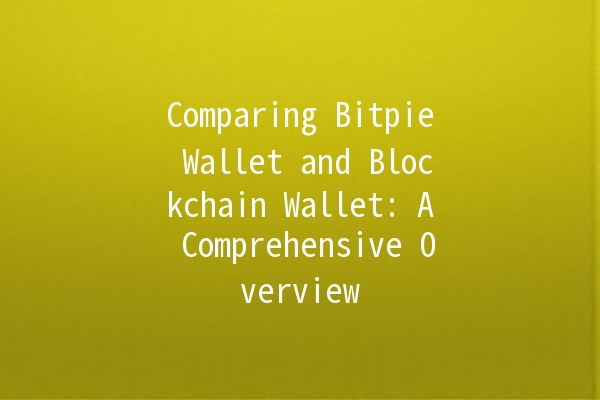
In the evolving landscape of cryptocurrency, choosing the right wallet is crucial for secure and efficient management of digital assets. Two popular options among users are the Bitpie wallet and traditional blockchain wallets. This article will delve into the differences and similarities between these two wallet types, providing insights that can help users make informed decisions.
Understanding Wallet Types
What is a Bitpie Wallet?
The Bitpie wallet is a digital wallet designed specifically for managing cryptocurrencies. It accommodates multiple blockchain networks, allowing users to store, send, and receive various cryptocurrencies. One of its standout features is its userfriendly interface that appeals to both novice and experienced users. In addition, Bitpie emphasizes security with features like multisignature support and hardware wallet integration.
What is a Blockchain Wallet?

A blockchain wallet typically refers to a wallet that works directly with blockchain technology. Unlike the Bitpie wallet, which is a multicurrency wallet, a blockchain wallet can often be specific to one type of cryptocurrency, such as Bitcoin or Ethereum. Blockchain wallets allow users to transact directly on the blockchain, giving them full control over their digital assets.
Key Differences Between Bitpie Wallet and Blockchain Wallets
Bitpie Wallet: Supports a wide variety of cryptocurrencies, including Bitcoin, Ethereum, and many altcoins. This makes it versatile for users with diversified portfolios.
Blockchain Wallet: Generally supports fewer currencies, focusing primarily on one or a select few, depending on the platform’s offerings.
Bitpie Wallet: Provides a sleek, modern interface that simplifies navigation. Ideal for beginners who may feel overwhelmed by complex layouts.
Blockchain Wallet: While functional, blockchain wallet interfaces can vary widely and may not be as userfriendly, especially for beginners.
Bitpie Wallet: Incorporates robust security measures, such as multisignature support and integration with hardware wallets for added security. It also offers a cold storage feature.
Blockchain Wallet: Security implementations can vary, but many basic blockchain wallets lack advanced security features, making them potentially more vulnerable.
Bitpie Wallet: Generally offers competitive transaction speeds and fees, as it allows users to choose their preferred blockchain for transactions.
Blockchain Wallet: Fees and transaction speeds can change depending on the blockchain network's congestion, which may lead to higher costs during peak times.
Bitpie Wallet: Offers multiple recovery options, which can help users restore their wallets in case of loss. This can include seed phrases and private key backups.
Blockchain Wallet: Backup procedures vary widely, but not all blockchain wallets offer comprehensive backup options.
Productivity Enhancement Tips for Crypto Wallet Management
Managing a cryptocurrency wallet effectively can greatly influence user experience and efficiency. Here are five productivity enhancement tips to consider.
Explanation: Enabling multifactor authentication (MFA) increases the security of your wallet by requiring additional verification during login.
Example: Most wallets, including Bitpie, allow you to set up MFA through apps like Google Authenticator. This adds an extra layer of security beyond just your password.
Explanation: Regularly backing up your wallet ensures that you do not lose access to your funds in the event of device failure or accidental deletion of the wallet app.
Example: Use the backup feature in Bitpie to create a seed phrase or private key backup, storing it in a secure offline location.
Explanation: Keeping a wellorganized portfolio can help you track your assets more effectively.
Example: Use tags or folders in your wallet if available, such as separating holdings by longterm and shortterm investments, or by asset categories.
Explanation: Setting alerts for transactions can help you keep track of market movements and your investment performance.
Example: Use the notification features in Bitpie to receive alerts on significant price changes of assets in your wallet.
Explanation: Regularly checking and updating your security settings can help protect your assets from emerging threats.
Example: Make it a routine to review and update your wallet's security settings every few months, adjusting MFA, examining connected devices, and changing passwords as necessary.
Frequently Asked Questions
Cryptocurrency wallets are designed to store and manage digital currencies. They allow users to send and receive coins and check their balances. Different wallets have different functionalities, with some focusing on simple transactions, while others provide more advanced features.
Yes, Bitpie wallet is particularly beginnerfriendly due to its intuitive design and userfriendly interface. It offers guided features that help new users understand cryptocurrency management.
The Bitpie wallet prioritizes security with its support for multisignatures, cold storage, and integration with hardware wallets. While no wallet can guarantee 100% security, Bitpie employs industrystandard protocols to safeguard user assets.
Generally, blockchain wallets are tailored to specific cryptocurrencies. However, some platforms have expanded to support multiple assets. Always check the wallet specifications to confirm which currencies are supported.
If you lose access, recovery depends on the backup methods you set up when creating the wallet. Using your seed phrase or private keys can help you restore access. Always ensure you have proper backups to avoid loss of funds.
Both types of wallets may charge fees for transactions, often dictated by the blockchain network used rather than the wallet itself. Always review fee structures before executing transactions to minimize costs.
Choosing between a Bitpie wallet and a conventional blockchain wallet largely depends on individual preferences and needs. Bitpie offers a more comprehensive, userfriendly design suitable for those managing multiple cryptocurrencies, while blockchain wallets may appeal to users focused exclusively on a single asset transaction. By understanding their key features, users can better navigate the world of digital currencies and ensure their assets remain secure.
Investing in the right tools and practices enhances your experience and efficiency, aiding you in your cryptocurrency journey. Whether you prefer the versatility of a Bitpie wallet or the direct access of a blockchain wallet, informed choices lead to better management of your digital assets.

